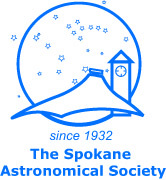
- This event has passed.
General Meeting
March 2, 2018 @ 7:30 pm - 9:30 pm
Speaker: Dr Matthew Geske of Gonzaga
Every second of every day, the Earth is being bombarded by charged particles known as cosmic rays. These cosmic rays are born in cataclysmic cosmic events such as supernovae, traveling through the Galaxy for thousands of years before reaching the Earth. First discovered in 1912, the field of cosmic ray science is a relatively young branch of astrophysics, and there is much that is still uncertain about their origins.
The study of cosmic rays opens an entirely new window into the universe, but detecting them is very difficult. To study them requires experiments that include some of the largest detectors ever constructed, as well as satellites and balloon borne detectors. These experiments have led scientists to all corners of the globe in search of new discoveries. Recent developments in the field include hints at the origin of the most energetic particles in the universe, and the operation of a world-wide network of detectors looking for early detections of supernovae.
